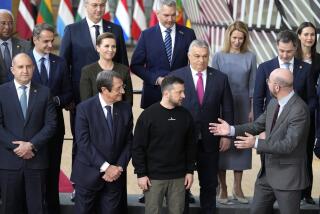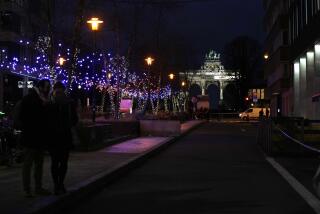POLITICS : Horizon Cloudy as EU Meets on Sunny Greek Isle
- Share via
BRUSSELS — The European Union’s semiannual summit, on the Greek island of Corfu today and Saturday, was envisioned as a look at Europe’s future.
The agenda carries an interim report on a planned multibillion-dollar trans-European network of new and upgraded rail lines and highways that will not just bind the continent more closely in the next century, but also create thousands of jobs and a vision in the process.
Russian President Boris N. Yeltsin, who arrived in Corfu on Thursday, will sign the first cooperation agreement between Russia and the EU. And a short time later, leaders of the union’s 12 member states are supposed to pick a successor to Jacques Delors as president of the EU’s Executive Commission--the organization’s single most powerful job.
However, there is a problem: discord.
Disagreements on funding surround the ambitious transportation plan, and the task of agreeing on Delors’ successor, which should have been managed in a series of discreet, gentlemanly consultations (there are no female EU leaders), has turned into a bruising and embarrassing fight.
Details have even leaked out of the smoke-filled rooms and onto the front pages of Europe’s leading newspapers.
As the summit convened, it was uncertain whether the job would go to Belgian Prime Minister Jean-Luc Dehaene (the choice of German Chancellor Helmut Kohl and French President Francois Mitterrand), to his Dutch counterpart Ruud Lubbers (said to be favored by the Danes and others but actively opposed by Kohl) or possibly to a long shot such as Britain’s Leon Brittan, currently the EU trade commissioner, or Ireland’s Peter Sutherland, a former EU commissioner who presided over last autumn’s successful round of world trade talks.
Deadlock is also possible, a scenario that would most likely force the 12 into a special summit later this year. Delors’ term ends in January.
With uncertainty clouding internal issues, the EU-Russia accord could wind up as the summit’s only event of lasting significance.
Yeltsin today will sign a “Partnership and Cooperation Agreement” with the EU that will establish a regular, formal political dialogue between Moscow and Brussels, open the prospect of an eventual EU-Russia free-trade agreement and improve the investment climate in Russia for EU-based private companies.
The accord is “a milestone on the road toward greater economic and political stability across the entire continent,” Brittan said.
*
Added Yuri A. Borko, of the Institute of Europe, Russian Academy of Sciences: “This is a qualitatively new level of partnership and cooperation between the (EU) and Russia. I think we got more or less optimal conditions.”
In an important concession by Moscow, the agreement will progressively open the Russian market to EU-based banks, breaking a ban on contact between Russian nationals and foreign lending institutions.
Five European banks already registered in Russia can start operations immediately: ABN-AMRO Bank and INGBank of the Netherlands, Societe General and Credit Lyonnais of France and Dresdner Bank of Germany. The EU is also expected to start opening its doors to Russian banks.
Economically, however, the pact seems to offer Moscow little in the short term, even though the EU is by far the largest importer of Russian goods.
Few trade experts believe that Russian manufactured products will be competitive in the West, and in many areas where Moscow could sell more to the EU--such as steel, textiles and some metals--the agreement carries restrictions.
France, for example, refused to go along with the accord until it received guarantees protecting its domestic nuclear fuel industry from cheap Russian enriched uranium.
*
Beth Knobel of The Times’ Moscow Bureau contributed to this report.
EU’s Give and Take
A new European Union trade accord with Russia will draw Moscow closer to Western Europe.
WHAT IT BUYS AND SELLS
EU imports from Russia, 1993: Minerals: 44% Metals: 14 Chemicals and related products: 4 Wood: 3
EU exports to Russia, 1993: Machinery/parts: 30% Processed food: 16 Vehicles/aircraft: 11 Chemicals and related products: 7
Source: European Union
More to Read
Sign up for Essential California
The most important California stories and recommendations in your inbox every morning.
You may occasionally receive promotional content from the Los Angeles Times.













